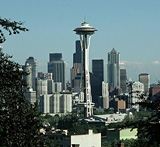Delegates to the World Trade Organization meeting in Seattle will be met by as many as 50,000 protesters from all around the world. WTO advocates seek to dismiss the protestors as anti-trade extremists who want to turn back the clock on human progress. In truth, the vast majority of the protestors will be coming from mainstream churches, unions, universities, independent businesses, and a wide variety of civic organizations concerned with such issues as democracy, economic justice, peace, and the environment. By contrast, the WTO’s most ardent proponents are corporate CEOs, professional lobbyists, P.R. consultants, trade bureaucrats, and politicians beholden to corporations for political contributions.

Sunny Seattle.
Few, if any, of the protesters want to stop trade, close borders, or desert the poor. Most are deeply committed to international cooperation to achieve peace, end poverty, secure the human rights of all people, and protect the living earth. They call for fair trade that is beneficial to people and communities, not free trade that allows corporations to bid down labor and environmental standards everywhere, while demanding ever larger tax breaks and public subsidies on the threat of exporting jobs. At the heart of the protests is a growing realization that the world’s largest corporations are using the secret forums and esoteric language of international trade agreements to free themselves from democratic accountability.
The advocates of free trade say the WTO provides needed trade rules. There is indeed a critical need for rules to regulate international trade, corporations, and finance in the human interest. The WTO, however, has no such mandate. To the contrary, it regulates democratic governments to prevent them from limiting the freedom of global corporations to do whatever they find most profitable.
For example, the WTO told the United States that it must relax its clean air standards and allow the import of dirtier gasoline. The WTO told Japan that it must reduce its testing for pesticides on imported produce. The WTO told Europeans that they cannot ban the import of genetically modified food products until they can prove conclusively they are harmful to human and environmental health. In each instance, the decision of a democratic government was overturned by unelected trade lawyers in Geneva on the grounds that it was a barrier to free trade — as if trade expansion were the most important of all human priorities.
We need rules for the global economy that protect and enhance the well-being of people, communities, and nature. For example, such rules would support the efforts of national and local governments to raise labor, health, and environmental standards. They would also support governmental efforts to curb international financial speculation and corporate tax evasion, limit the concentration of corporate power, and protect local enterprises from predatory forms of global competition. In every instance, the WTO actively hinders governmental efforts to act on these and other basic obligations to their citizens. It is anti-democratic, anti-people, and anti-environment. That is why tens of thousands of protesters are coming to Seattle to say NO to the WTO.

